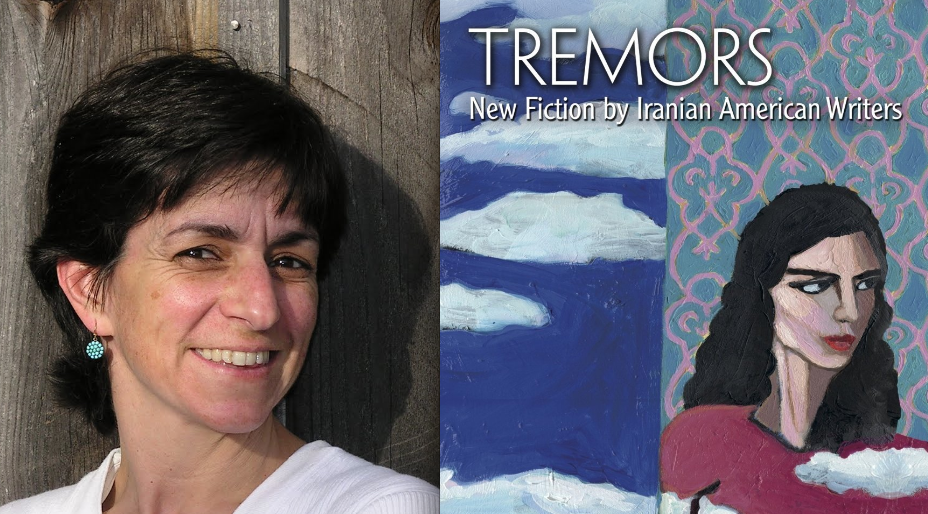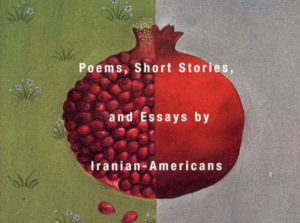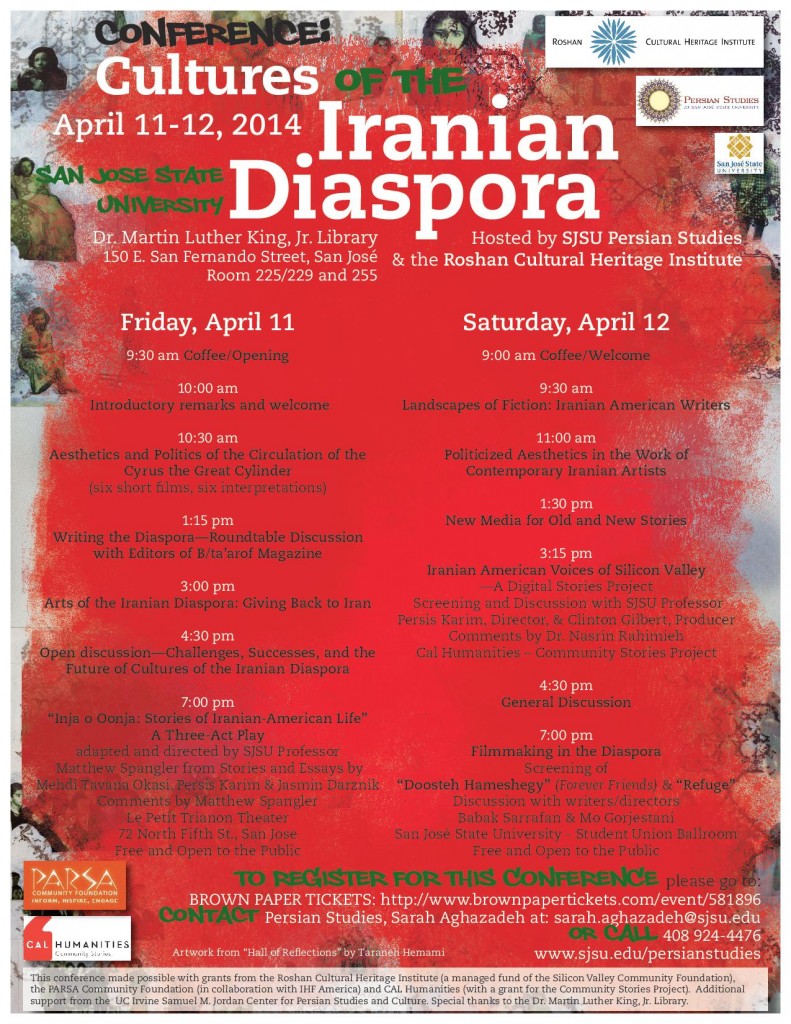FICTION & IRANIAN AMERICAN DIASPORA – PERSIS KARIM
Ever wonder where the Iranian American writers are at? Poet and professor Persis Karim has made it easy to find out by constantly bringing together Iranian American creatives in events, exhibits, and publications for 15 years. The THREE anthologies of Iranian American writing she’s edited are such a great guide for us to get to know a multiplicity of Iranian authors and perspectives: A World Between: Poems, Short Stories, and Essays by Iranian-Americans (1999), Let Me Tell You Where I’ve Been: New Writing by Women of the Iranian Diaspora (2006), and most recently Tremors: New Fiction by Iranian American Writers (2013).
By providing forums for evolving conversations on Iranian American identity, Karim’s work builds community and surfaces nuanced representations of different Iranian American identities thereby breaking essentialist molds. We are blessed to be able to cover the conference she is organizing at San Jose State, and got her on the phone to talk about the role of arts in both academia and Iranian American diaspora.
~*~*~*
B: You’re organizing this amazing conference in particular that bridges fiction, art, film, and tech. What’s the importance of the focus on creative production in this academic setting?
PK: The conference is an occasion to bring together artists I’ve met over the years who I think have things to share with each other in ways that we don’t have many opportunities to do. Sometimes artists work in isolation expressing themselves, and they need and want feedback because they’re working with the way their art is influenced by larger stories of immigration, exile, war and the history of the Iranian community. I think artists are tackling some of those questions, whether its conscious or unconscious.
By having all of the disciplines, you break the artificial categories. When having conversations you recognize that people are influenced by each other, or drawing on the same stories, even if they have different conclusions or representations. Art reaches others, communicates to others, and questions other people’s perceptions. In editing these anthologies I’ve found a kind of symphony of voices, even if that sounds kind of cliche, there’s no one singular voice. Its important to represent the diversity of experience, in doing that you can break some of the stereotypes people have about Iran and Iranians.
B: How did you first find this community or build it?
PK: It can start with 1 or 2 people telling others, but I think the anthologies at some deep level were the beginning of a community of people who were writing. After putting out a call in 1998 (for the first anthology), I got a surprising amount of people responding, and thought, “Wow! People are writing but don’t have a forum to address their issues.” I could have written something for myself, but instead I said I want to participate in something bigger than me. It wasn’t that conscious, but the vocabulary was just not there to talk about my experiences and I wanted to make that part of what happened, by making an anthology. And then it just happened. The more you reach out to people, the more people see you as a hub.
B: We all know sharing an aspect of identity doesn’t necessarily mean getting along. Has coordinating so many Iranians with the different tastes, opinions, and ideologies made it hard to build community?
PK: It’s not hard, in a way it’s interesting. Having grown up in the U.S. with one Iranian parent, I find myself an insider/outsider, and I find that experience just as important as someone who grew up in Iran with more exposure to traditional Iranian art. So it’s not hard, but it requires a sensitivity to ideas that not everyone is the same or has the same experience, or wants to express the same sentiments. I think Americans who are being fed a negative image of Iran made up of what the media says are looking to find a singular image or experience, and there isn’t one, there can’t be one. Just as there is no singular experience of what it is to be American.
B: Salute. As someone working within the institution of academia at a public university, what keeps you motivated for sticking with what you believe in when deciding your writing, curriculum, and events, versus selling out.
PK: What motivates me is a sense of integrity and respect. There are a lot of ways that you could “sell out” in this country. You could sell out by writing about something that trashes Iran. This is just my personal view, but what is important for me is I have a certain respect for Iran as a place and a culture, as a place that has survived and evolved over thousands of years. For me this came through poetry and literature, because I feel respect that art has a place in that culture. I want to reflect that in the work I do in Iranian culture.
The important thing for me is not to reinforce a simplistic view of Iran, but to complicate it. In the (Cultures of the Iranian Diaspora) Conference I try to show how artists are engaging a complicated view of Iran that is motivated not by a desire to sell things but a desire to engage with things.
B: Are there any panels you’re especially excited about?
PK: I’m excited about all of the panels, but one that I am personally looking forward to is a staged adaptation of three stories from Tremors (the anthology I edited) put on by a playwright that is a college of mine. I think it is really important for people to have the experience of witnessing people’s stories. When we can present something on stage or in film with people that’s great. That’s Friday night and open to public.
There’s also a filmmaker panel Saturday night that I’m excited about because one of the filmmakers is a colleague at San Jose State, Babak Sarrafan, screening a film “Doosteh Hameshegy” (Forever Friends) that he made in grad school in the 80’s during the Iran Iraq war, and then one film by Mo Gorjestani, “Refuge,” about Iranians in Silicon Valley in the future, in 2020, in the event that there is a cyber-war, so I see these as very interesting poles. One is trauma of arrival, and here we are over 30 years later, and we could be vilified at the drop of a hat. I’m interested in how film can tell these stories that have resonance about American society and Iranians.
B: In terms of your own writing, how is it tied to your engagement of the Iranian aspects of your identity?
PK: I was personally motivated to learn a little about my background, and writing became a vehicle. I think a lot of people are drawn to a medium to explore something about themselves. Art is a natural vehicle for exploring one’s self. As my writing has evolved, I’ve realized that being Iranian is only one aspect of my personality, but the writing became a vehicle to explore a part of myself too, that I had no vocabulary for, and then being (an) editor helped shape a conversation about that. I got to mobilize a conversation that hasn’t existed in my life before, and to build more of a vocabulary for talking about it, and recognizing it for others.
Now its different since there so much more exposure. I don’t feel the same urgency now as 20 years ago, but the conversation is still evolving. With the problematic relationship between the United States and Iran, it is on people’s minds. Perhaps if Iran and the United States come to a place of rapport, it won’t be as urgent, but it’s been a part of our history, and when there’s misunderstanding, one looks for ways to communicate.
B: LAST WORDS?
I hope people see this conference not so much as an academic conference at all, but it’s really an opportunity to understand and participate in the very important evolving conversation about the role of art in both creating new ways of seeing and also drawing on old stories that still inform many people.
~*~*~*


